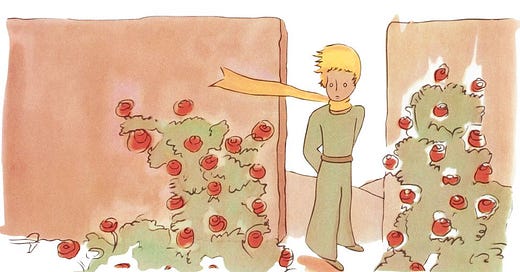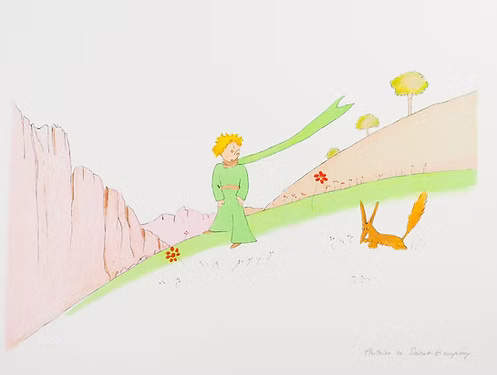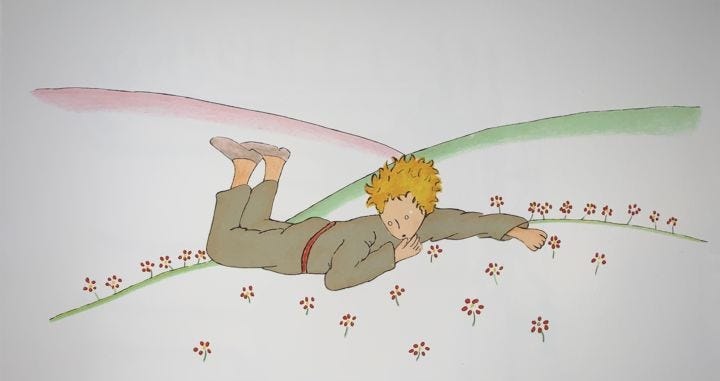Bienvenue à Literary Bites
A new space where we slow down, savor French through its most touching texts, and connect with the soul of the language.
Today, I want to share an excerpt from Le Petit Prince by Antoine de Saint-Exupéry.
This book holds a special place in my heart. Not only is it one of the most beloved French works worldwide, but its universal message about love and the invisible essentials speaks to all of us, no matter our age.
It reminds us that what truly matters is felt, not seen.
L'Extrait
Le petit prince s'en fut revoir les roses:
- Vous n'êtes pas du tout semblables à ma rose, vous n'êtes rien encore, leur dit-il. Personne ne vous a apprivoisé et vous n'avez apprivoisé personne. Vous êtes comme était mon renard. Ce n'était qu'un renard semblable à cent mille autres. Mais j'en ai fait mon ami, et il est maintenant unique au monde.
Et les roses étaient bien gênées.
- Vous êtes belles, mais vous êtes vides, leur dit-il encore. On ne peut pas mourir pour vous. Bien sûr, ma rose à moi, un passant ordinaire croirait qu'elle vous ressemble. Mais à elle seule elle est plus importante que vous toutes, puisque c'est elle que j'ai arrosée. Puisque c'est elle que j'ai mise sous globe. Puisque c'est elle que j'ai abritée par le paravent. Puisque c'est elle dont j'ai tué les chenilles (sauf les deux ou trois pour les papillons). Puisque c'est elle que j'ai écoutée se plaindre, ou se vanter, ou même quelquefois se taire. Puisque c'est ma rose.
Et il revint vers le renard:
- Adieu, dit-il...
- Adieu, dit le renard. Voici mon secret. Il est très simple: on ne voit bien qu'avec le cœur. L'essentiel est invisible pour les yeux.
- L'essentiel est invisible pour les yeux, répéta le petit prince, afin de se souvenir.
- C'est le temps que tu as perdu pour ta rose qui fait ta rose si importante.
- C'est le temps que j'ai perdu pour ma rose... fit le petit prince, afin de se souvenir.
- Les hommes ont oublié cette vérité, dit le renard. Mais tu ne dois pas l'oublier. »
Audio :
La Traduction :
The little prince went to see the roses again:
"You are not at all like my rose," he told them. "You are nothing yet. No one has tamed you, and you have tamed no one. You are like my fox was. He was only a fox like a hundred thousand others. But I made him my friend, and now he is unique in all the world."
And the roses felt quite embarrassed.
"You are beautiful, but you are empty," he continued. "One could not die for you. Of course, to an ordinary passerby, my rose would look just like you. But to me, she is more important than all of you, because it is her that I watered. Because it is her that I sheltered with a glass globe. Because it is her that I protected with a screen. Because it is her whose caterpillars I killed (except for two or three, for the butterflies). Because it is her that I listened to when she complained, or when she boasted, or even sometimes when she said nothing at all. Because she is my rose."
And he returned to the fox:
"Farewell," he said.
"Farewell," said the fox. "Here is my secret. It is very simple: One sees clearly only with the heart. The essential is invisible to the eye."
"The essential is invisible to the eye," the little prince repeated, so that he would remember.
"It is the time you have wasted/spent for your rose that makes your rose so important."
"It is the time I have wasted/spent for my rose..." said the little prince, so that he would remember.
"Men have forgotten this truth," said the fox. "But you must not forget it."
Vocabulaire clé & Expressions :
semblable à — similar to
apprivoiser — to tame
un passant — a passerby
abriter — to shelter
un globe — a glass dome
un paravent — a screen (to protect from wind)
se plaindre — to complain
se vanter — to boast
se taire — to be silent
l'essentiel — the essential
invisible — invisible
se souvenir — to remember
perdre du temps — to waste time
important(e) — important
gêné(e) — embarrassed
croire — to believe
élever (une rose) — to nurture, to raise (in the context of the rose)
le cœur — the heart
oublier — to forget
Points de Grammaire
1. Le Passé Composé : Expressing Past Actions
The passé composé is one of the main ways to talk about the past in French.
It is used to describe:
completed actions ("I did, I went, I finished...")
events that happened once or a specific number of times in the past.
How it is formed:
➔ Subject + auxiliary verb (avoir or être) + past participle
Most verbs use avoir as the auxiliary.
Some verbs (mainly movements or reflexive verbs) use être.
Example from the excerpt:
J'en ai fait mon ami — "I made him my friend." (avoir + fait)
Tu as perdu du temps — "You wasted time." (avoir + perdu)
C'est elle que j'ai abritée — "It's her that I sheltered." (avoir + abritée)
Important:
When the auxiliary verb is être, or when the direct object comes before the verb, the past participle must agree in gender and number with the subject or object.
(abritée agrees with elle = feminine singular)
Quick examples:
Elle est allée au marché. (She went to the market.)
Ils sont partis tôt. (They left early.)
2. Relative Clauses: Saying "the thing that..." or "the one that..."
A relative clause helps connect two ideas by using a relative pronoun like que, qui, or où.
Examples:
Puisque c'est elle que j'ai arrosée.
(Because she is the one that I watered.)Puisque c'est elle que j'ai écoutée.
(Because she is the one that I listened to.)
How it works:
que replaces the object of the second sentence.
qui replaces the subject of the second sentence.
A la Rencontre de l'Auteur :
Antoine de Saint-Exupéry (1900–1944) was a French writer, poet, aviator, and a dreamer.
Best known for his timeless masterpiece Le Petit Prince, he combined simple, poetic language with profound reflections on human nature, love, and responsibility.
Much like his beloved Little Prince, Saint-Exupéry lived a life between earth and sky. As an airmail pilot, he crossed deserts and oceans, and his adventures deeply inspired his writing. His style is direct yet poetic, filled with universal truths that touch the heart of readers young and old.
A mystery surrounds his final flight:
In 1944, during a reconnaissance mission for the Free French Air Force, Saint-Exupéry disappeared over the Mediterranean Sea. His plane was only found decades later, reinforcing the legend of a man forever destined to belong to both the heavens and the imagination.
Dernière Pensée
"C'est le temps que tu as perdu pour ta rose qui fait ta rose si importante."
May we all cherish the invisible essentials, the moments, the care, and the love we give to others.
Until next week, keep poetry, language, and meaning close to your heart.
À très bientôt,
Morgane










